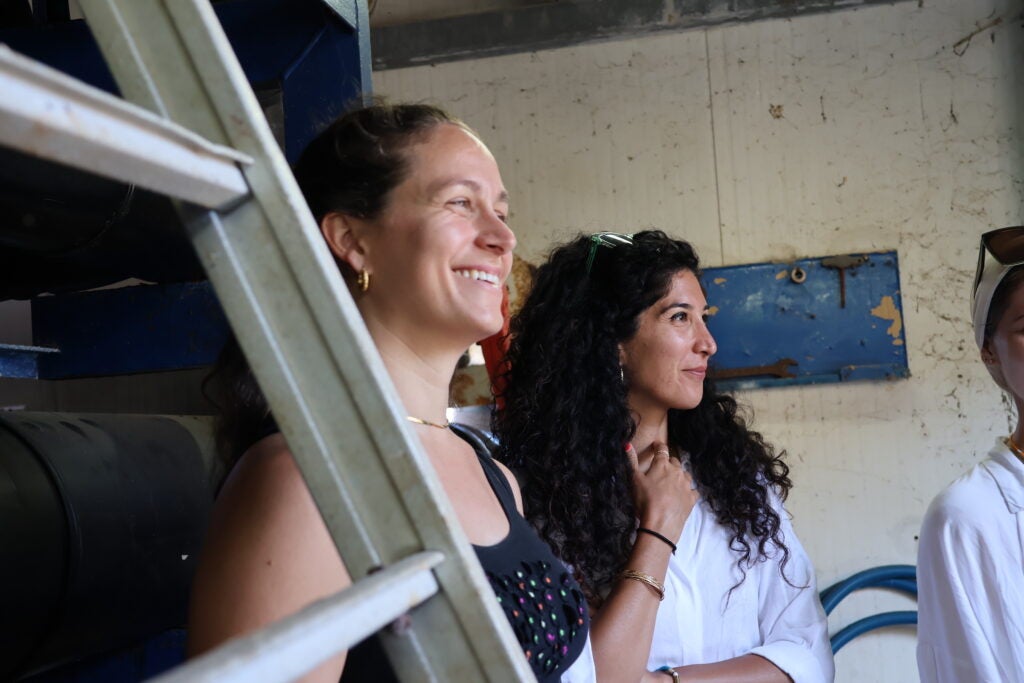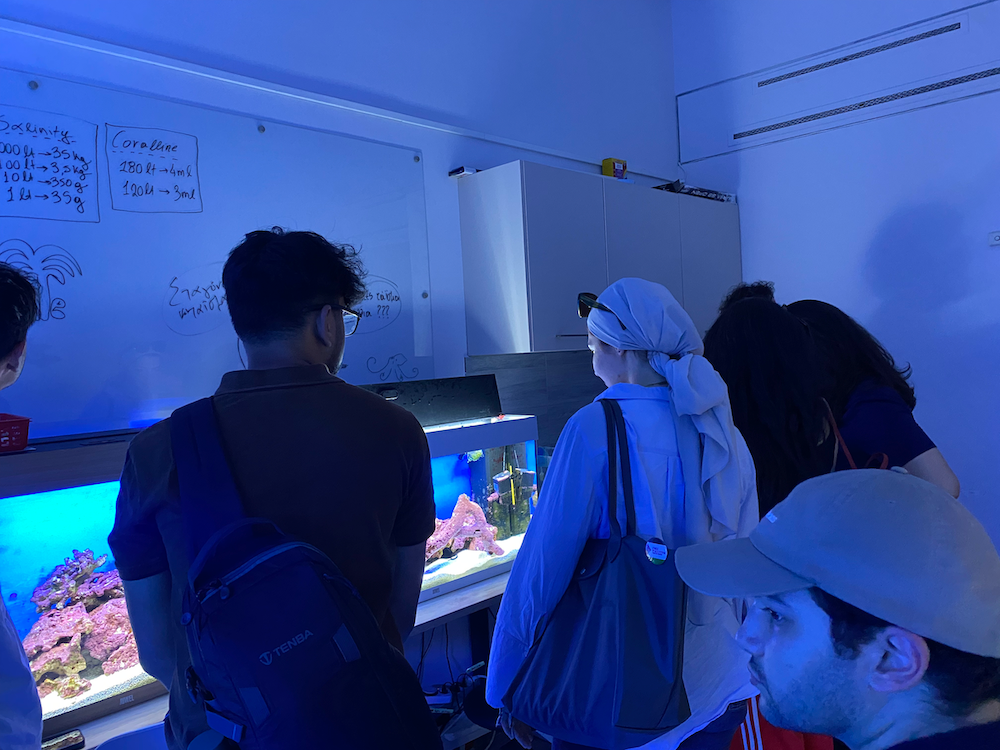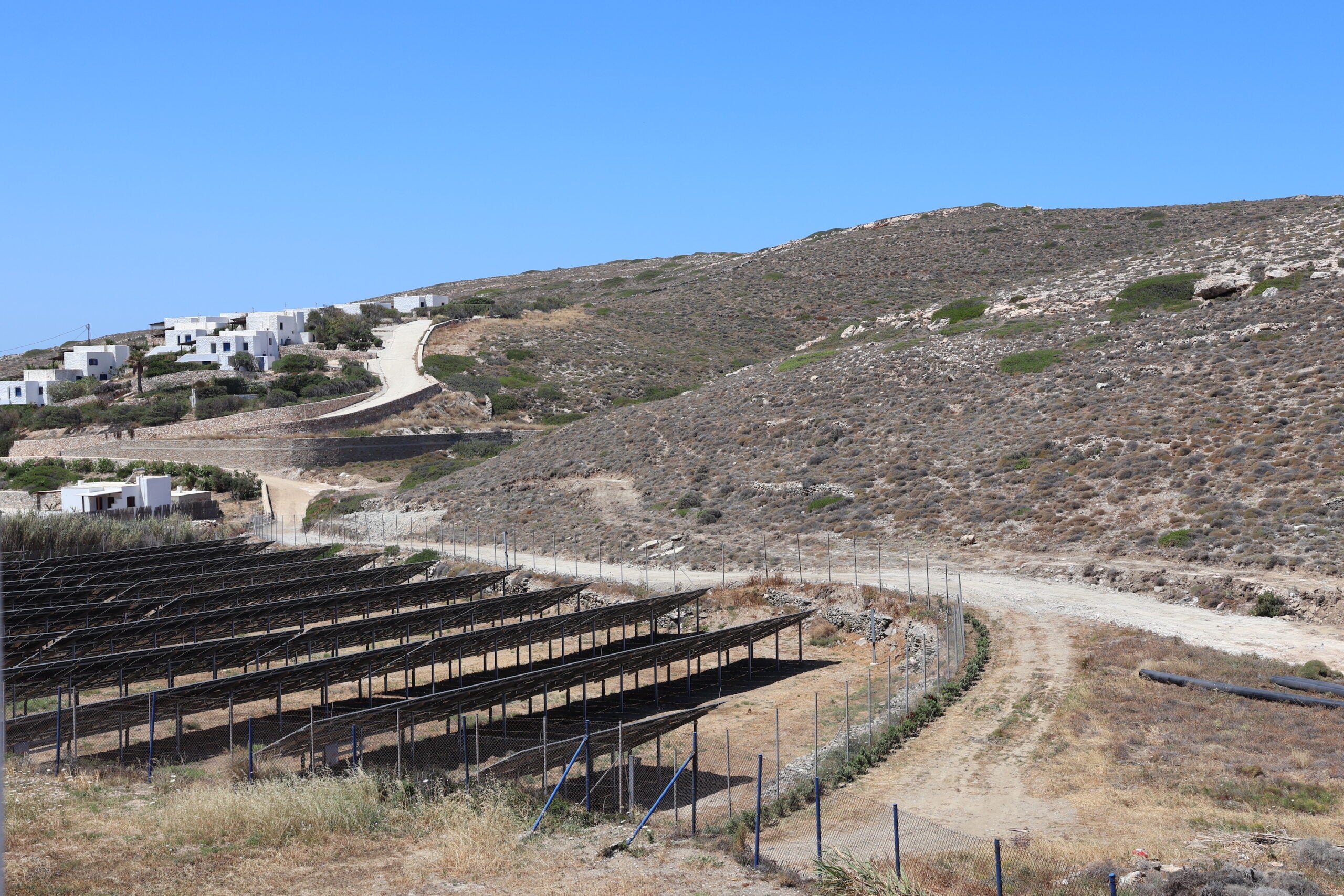On the Ground in Greece with the Earth Commons
ECo Greece pilots a model for international environmental collaboration in a climate change hotspot
The vision is interdisciplinary, global, and ambitious; the results are tangible international partnerships aimed at meeting the intense demands of the ecological crisis.
While the Earth Commons, Georgetown University’s Institute for the Environment and Sustainability (ECo), has settled in on the D.C. campus over the last few years—bringing together environmental and sustainability scholars, creating an undergraduate and graduate joint degrees, establishing a rooftop urban farm, and producing popular events and communications—ECo has also been hard-at-work visioning and planning a model for global collaboration.
“These lessons resonate beyond the island, speaking to the broader challenges we face with climate change.”
Zainab Ayub, student in “Adaptation in a Climate Hotspot”
The concept: develop engaged research and learning operations around the world with dedicated, on-the-ground personnel to create international partnership opportunities for Georgetown students and researchers to have an impact on a global scale. These hubs are to be living laboratories where students, professors, and government and non-government partners seek scalable solutions for a greener, more sustainable world through educational opportunities, research, and practical solution implementation.
And the vision is underway.
End of carousel collection.
In May 2023, the first pilot of this concept was established in Greece—and it already has some exciting successful collaborations under its belt.
Greece is a country where both the impacts of the climate crisis have been readily visible for many years and where strong governmental and academic networks are eager to work with international partners to address the crisis.
It was posited that the Earth Commons’ vision for collaboration would find purchase in Greece—and it has. Indeed, the first year of ECo Greece has been a whirlwind of relationship building, programming initiation, and the development of models that are hoped to be replicable to other sites globally.
All of this is led by ECo Greece’s first on-the-ground appointment, Katerina Downward, managing director for ECo Greece. A Greek native and Georgetown alumna, Downward has dedicated the last decade to social justice and human rights work, particularly in education and refugee protection and integration. She works in partnership with Peter Poulos, the Director of Partner Relations for ECo Greece, to develop support and partnerships for the initiative in Greece and beyond.
Downward spends much of her time relationship-building. She says the response from Greek counterparts in academic institutions, government entities, and private companies has been positive. At the crossroads of three continents and as a member of the EU, Greece fosters a spirit of collaboration. Georgetown’s alumni, students, and faculty offer valuable resources, providing a rich pool of expertise from which partnerships can flourish.
These early efforts have translated into exciting collaborations in ECo Greece’s first year; namely, a joint award with Fulbright Greece, Georgetown’s participation at this year’s Our Ocean Conference, a capstone project program for Georgetown’s Masters of Science in Environment and Sustainability Management (MS-ESM) students, and a pilot summer course in Greece in collaboration with Georgetown University-Qatar (GU-Q).

Katerina Downward and Dr. Raha Hakimdavar during a tour to an island desalination plant offered as a part of the ECo Greece’s summer course offering.
The first, the Fulbright Georgetown Partner Award is the opportunity for Greek graduate students to pursue the MS in Environment & Sustainability Management (MS-ESM) at Georgetown University with full funding split between Fulbright Greece and Georgetown. This collaboration is an exciting recognition of the value of the MS-ESM degree offered jointly by the Earth Commons, the McDonough School of Business, and the Graduate School of Arts and Sciences, now entering its third year.
The work of ECo Greece also translated into representation for Georgetown at the Our Ocean Conference which convened in Athens in April of 2024. This 9th annual conference brought together invitation-only delegates from 120 countries to discuss and pledge commitments to global ocean matters. As the longest coastline in the Mediterranean Basin and a country committed to the transition to a blue economy, Greece was a fitting and important staging ground for the conference—and, with a presence already in Greece, Georgetown was invited to participate. Downward and Dr. Raha Hakimdavar–Advisor to the Deans of the Earth Commons and GU-Qatar– represented Georgetown at the conference. Dr. Hakimdavar spoke on two panels focusing on the role of education in protecting our oceans: “The Future of Ocean Science Studies at Universities” and “Multi-disciplinary Knowledge for Ocean Sustainability: the Role of Universities.”
End of carousel collection.
On-the-ground relationship building in Greece has also resulted in valuable capstone projects for MS-ESM students with prominent Greek companies. Thirteen master’s students completed capstone projects with three Greek private sector companies. The companies listed have impressive standing in the market at 4th, 7th, and 12th largest market caps respectively: OTE Group (Greece’s top technology company), Public Power Corporation (one of the country’s largest integrated energy companies), and Helleniq Energy (Greece’s largest electric power company). MS-ESM Program Director Kerrie Carfagno says, “Incorporating international partnerships into our capstone projects has a multitude of benefits for everyone involved. The nature of the collaboration meant students needed to understand how a company strategically grew within Greece and how it competes with international companies. Students had to look at global market forces, industry-specific implications, climate change as a disruptor, and also climate change as an opportunity to create thoughtful assessments and recommendations for each company.”
For students, the collaborative capstone projects have been an exciting, hands-on learning opportunity. One student, for example, who conducted their project with OTE, explains “working with a local organization provided invaluable insight into how sustainability experts in Greece are tackling industry challenges…This experience highlighted the critical role the telecoms industry plays in advancing sustainability initiatives across other industries.” The partners also facilitated learning for the students by offering feedback “instrumental in shaping [the] project, teaching [the students] the importance of clear, direct business presentations and [the importance of] effectively balancing both scientific insights and business objectives, making our idea more marketable.”
Incorporating international partnerships into our capstone projects has a multitude of benefits for everyone involved.
Kerrie Carfagno, MS-ESM Program Director
Finally, this summer GU-Q piloted an immersive, collaborative course with ECo Greece. The GU-Q students spent two jam-packed weeks engaging with over ten local partners across four locations throughout Greece and then returned back to campus in Qatar to finish a three-week seminar for the course. By diving deep on the issues and solutions at work in Greece, [we] found that “these lessons resonate beyond the island, speaking to the broader challenges we face with climate change,” explains Zainab Ayub, a student reflecting on their time in the program. Underscoring the nuance between local and global work, they continue, “adaptation, it seems, is not just about surviving but about understanding and working with the structure and culture of the land.”
The students are currently wrapping up final group projects in collaboration with partners in Greece on topics including biodiversity conservation and ecotourism development, sustainable water management on the Cycladic Islands, marine plastic pollution, and sustainable scaling of small organic farms.
End of carousel collection.
The course was designed and facilitated by Dr. Hakimdavar of GU-Q. Dr. Hakimdavar is excited about the interdisciplinary, collaborative, global vision of the Earth Commons. She sees that opportunity for collaboration in her own region, the Persian Gulf. Dr. Hakimdavar explains that many countries in the region are looking for sustainable change and seeking collaboration on the best sustainability solutions. In organizing the course, Dr. Hakimdavar trialed the efficacy of working with ECo Greece as a collaborator. She noticed that the on-the-ground hub created “continuity with local partners, real connections with local contacts [and] ensured two-way collaboration. Georgetown students are able to give back as much as they are gaining.”
For the course, ECo Greece secured the collaboration of 10 local partners including the University of Athens, the European Public Law Organization’s Institute for Sustainable Development, the Andros Research Centre, Petra Farm, the Paros Water Supply and Sewerage Company, and the Urban Dig Project. Students benefit from the education and real-world international experience and partners receive needed support to address the climate questions of our time.

During a visit to the University of Athens Biology Department’s Wet Lab, the class explored how changing climatic conditions affect marine life, gaining hands-on insights into the critical connections between climate and marine ecosystems.
Moving forward, the goal is to expand educational and research partnerships and increase opportunities for action. Expanding educational opportunities include study abroad programs, short-form immersions, the extension of capstone projects, and internships for Georgetown’s D.C. campus and with GU-Q. The ambition is to hire joint scholars in Greece to develop and lead research and action-focused programs to increase collaborations with Greek academic institutions, create post-doc opportunities, and facilitate faculty exchange programs. Throughout all of this, ECo Greece will hold the implementation of climate solutions at the forefront of its actions and create opportunities for community involvement through speakers and event series.
After a year of sowing seeds, ECo Greece is well-poised to continue growing into all that is envisioned–and to set the course for other ECo Hubs globally.
- Tagged
- ECo Greece

















